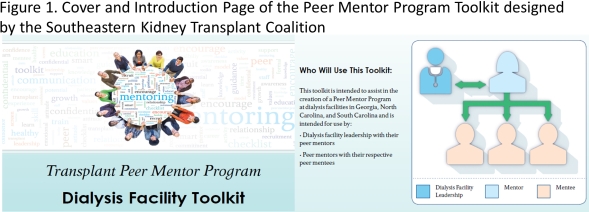Peer Mentoring to Improve Access to Kidney Transplantation in the Southeast.
J. Gander,1 S. McMath,2 M. Rudd,2 L. Sauls,3 S. Tripathi,1 L. Plantinga,1 L. McPherson,1 T. Browne,4 S. Pastan,1 R. Patzer.1
1Emory University, Atlanta
2Georgia Transplant Foundation, Atlanta
3ESRD Network 6, Raleigh
4University of South Carolina, Columbia.
Meeting: 2016 American Transplant Congress
Abstract number: 551
Keywords: Kidney transplantation, Psychosocial, Public policy, Quality of life
Session Information
Session Name: Concurrent Session: Psychosocial and Treatment Adherence
Session Type: Concurrent Session
Date: Tuesday, June 14, 2016
Session Time: 4:30pm-6:00pm
 Presentation Time: 5:42pm-5:54pm
Presentation Time: 5:42pm-5:54pm
Location: Room 206
BACKGROUND The Southeastern Kidney Transplant Coalition's (SEKTC) mission is to improve the low kidney transplantation (KTx) rate in the North Carolina, South Carolina, and Georgia. Our aim was to evaluate a KTx-specific Peer Mentor Program and develop a dialysis facility-specific Peer Mentor Program Toolkit.
METHODS A SEKTC subcommittee developed and implemented a Peer Mentor Program in 2014. Peer mentors were healthy examples of transplant recipients matched to a Georgia dialysis facility to complete monthly visits. Dialysis facility staff, peer mentors, and mentees (dialysis patients) were surveyed regarding the Peer Mentor Program; survey results were used to develop a Peer Mentor Program Toolkit.
RESULTS Preliminary evaluation showed facility staff 'agree' or 'strongly agree' that the peer mentors provide social support (80%), improve a patient's knowledge about KTx (80%), and encourage dialysis patients to educate themselves about KTx (60%). To date, the participating peer mentors (n=9) have completed 710 patient encounters over 54 visits in 12 different dialysis centers. To improve the program, staff suggested a more facility-specific mentor program in which the mentor would represent patient demographics, live locally, and be available to meet with patients outside of the dialysis facility. To address these comments, the SEKTC subcommittee developed a Peer Mentor Program Toolkit  designed to help facilities recruit and train local KTx recipients to serve as peer mentors. The toolkit is a 63-page electronic booklet written at an 8th-grade level, and includes peer mentor recruitment strategies and tools, mentor training materials, and activities a mentor could complete with their mentees.
designed to help facilities recruit and train local KTx recipients to serve as peer mentors. The toolkit is a 63-page electronic booklet written at an 8th-grade level, and includes peer mentor recruitment strategies and tools, mentor training materials, and activities a mentor could complete with their mentees.
CONCLUSION The Peer Mentor Program Toolkit has the potential to facilitate improvements in patients' and other stakeholders' decision-making about KTx by augmenting a patient's social support and improving their knowledge about the KTx process.
CITATION INFORMATION: Gander J, McMath S, Rudd M, Sauls L, Tripathi S, Plantinga L, McPherson L, Browne T, Pastan S, Patzer R. Peer Mentoring to Improve Access to Kidney Transplantation in the Southeast. Am J Transplant. 2016;16 (suppl 3).
To cite this abstract in AMA style:
Gander J, McMath S, Rudd M, Sauls L, Tripathi S, Plantinga L, McPherson L, Browne T, Pastan S, Patzer R. Peer Mentoring to Improve Access to Kidney Transplantation in the Southeast. [abstract]. Am J Transplant. 2016; 16 (suppl 3). https://atcmeetingabstracts.com/abstract/peer-mentoring-to-improve-access-to-kidney-transplantation-in-the-southeast/. Accessed January 11, 2026.« Back to 2016 American Transplant Congress
